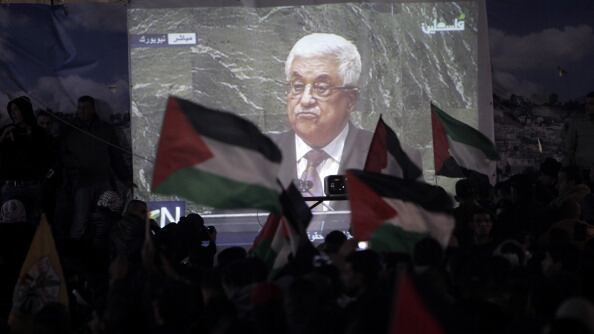Which would you prefer: the stalemate you know, or the change you don’t?In voting for Palestinian statehood—or something reasonably approaching it—the U.N. General Assembly, and the Palestinian Authority itself, has overwhelmingly chosen the latter. As a pro-Israel, pro-peace progressive Zionist, I had opposed this move a year ago, as it seemed to short-circuit negotiations and threaten chaotic legal action in international fora. But this year, on the eve of the coming Israeli elections, I support it.

What’s changed? The sudden clarity of the Israeli right’s plan: to do nothing, get tough, and wait decades to lower Palestinian expectations. The emperor has no clothes anymore: we now know that Netanyahu’s talk of peace is a canard, because the Israeli Right thinks it unattainable or undesirable. Evidence? The new Likud list for parliament (filled with far-right hawks and nationalists), the alliance with Yisrael Beiteinu (same), the insistence on “no preconditions” for talks (i.e. no hope of an agreement), and the increasing openness of conservative pundits to talk about a hundred more years of occupation and conflict.
None of these new data points suggest that what the Netanyahu government wants is a somewhat tougher negotiating line en route to a two-state solution. On the contrary, they show that the current Israeli leadership has given up on that solution, at least in the short term. The right’s strategy is to be to wear down the Palestinians, over decades—again, I’m not making this up: rightists Danny Danon and Daniel Gordis have said so openly—at which point, somewhere in the middle of the century, Israel can get a better deal than it can today. Indeed, this narrative is offered up not as opinion but as fact. The Palestinians are not ready for peace today, we are told. There is no choice but to tough it out and wait.Yet of course, there is a choice.
If this government were not beholden to its settler and nationalist fringes, it could cut a deal tomorrow with Prime Minister Abbas, and work out the difficult details of Jerusalem, refugees, and viable security measures for Israel (which would probably include an international presence on the West Bank). These are not easy challenges, but they are surmountable. In fact, they are far more surmountable than the costs of a century of occupation, together with increasing marginalization for Israel.
From the Israeli point of view, however, it’s easy to understand the disinclination to do anything. The ‘separation wall’ works exceedingly well; the average Israeli in Afula or Ashdod has no idea what’s going on in Hebron or Ramallah, let alone East Jerusalem. And they don’t want to know. The Palestinians had their chance, at Camp David with Ehud Barak, and they blew it. So screw them. And when Hamas fires rockets at schools and hospitals—well, screw them harder.
I don’t want to minimize the resonance of this view. It is born out of the same frustration that many Palestinians feel, when they look at twenty years of the “peace process” and see expanded settlements and still no state of their own. And I’m not kidding when it’s easy to understand it. This process hasn’t worked for anyone.
The difference is that Israelis can ignore the occupation and Palestinians cannot. And so while Palestinians search for a solution to the conflict—armed resistance in the case of Hamas, diplomatic maneuvers in the case of the PA/Fatah/the PLO—many Israelis are content to say it cannot be solved, fortify the wall, and think about other things.
This is an asymmetry, and it has led to stasis. American politics being what they are, no U.S. administration is really going to pressure an Israeli government to make concessions. And Israel has other things to worry about—Iran most of all. For months now, possibly for years, it’s been hard to see any way forward on the Israeli side. There just isn’t any motivation, on the part of the Israeli population, to do anything. And all the while, Israel puts more facts on the ground: more settlements, more bypass roads, more roadblocks in the way of a viable West Bank state.
What options did the Palestinians have left? Well, the ones they’ve exercised in the last few weeks: intensified conflict, and intensified diplomacy. I won’t defend the former—not when it means deliberately targeting civilians. But I will defend the latter. What is Mahmoud Abbas supposed to do? Sit on his hands and wait until Israelis’ moods shift? What other cards does he have to play?
It should be obvious that we don’t know the effects of yesterday’s statehood vote. They may be nil, they may be enormous, or (more likely) they may fall somewhere in between. The most foolish thing anyone can do in the Middle East is make predictions about its future.
But from the Palestinian perspective, anything is better than this standstill—which isn’t really a standstill, since settlements expand while Palestinian areas do not. And from the pro-peace Israeli perspective, anything is better than Hamas, so if today’s victory strengthens Abbas vis-à-vis Hamas, it is a step forward for the two-state solution.
If nothing else, I hope the vote is—as the cliché goes—a game changer. Because over the last twelve months, we’ve seen the game the Israeli Right wants to play; it’s tipped its hand several times. But the stakes are just too high.





